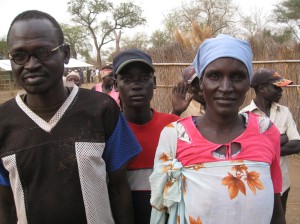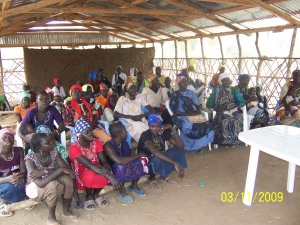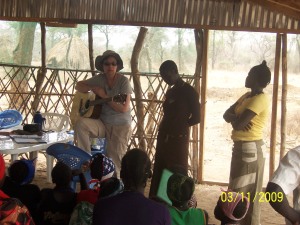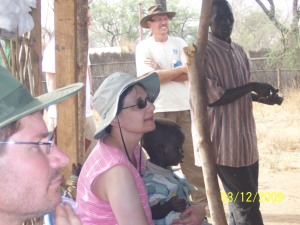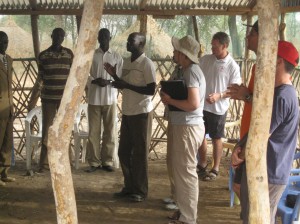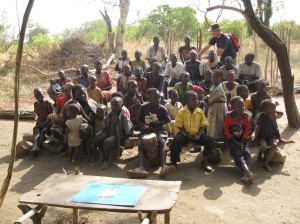
Church in Tedubi
The people in Tedubi sat waiting for us to come and teach. It took us three hours to hike there, so you can imagine how long they sat there waiting for us to arrive. It is not easy terrain to hike — maize fields, dirt trails, up and down through the dry riverbed, etc. I was fine getting to Tedubi. Coming back was another story.

Return from Tedubi via the dry riverbed

Village on the hike to/from Tedubi

Woman on the trail to Tedubi
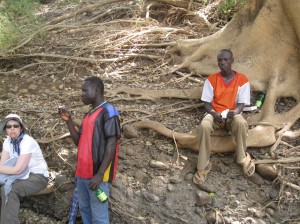
Resting at the riverbed with Michael and Lewo
Michael and Lewo are two of the young Sudanese men that I was privileged to get to know while I was in Dajo. They both spoke English and had been educated in Khartoum. Lewo had converted from Islam to Christianity about 2 months before our arrival in Dajo. They are both extraordinary young men.
Michael was one of the young men who wanted to learn how to play guitar and learn all the songs. He certainly has a heart for worship and for teaching the local people. Watches were coveted gifts for the translators and when we left, Michael was one of the only translators who did not get a watch. My luggage got left in the States and I did not get my suitcase until our return to Nairobi — that is another story in itself — and so I didn’t have my translator gifts with me. I left other gifts for Michael, but not a watch. So when the missionaries return to Dajo in September when their furlough is over, Michael will get a watch. I am sending several things back with the missionaries and a watch for Michael is one of those items.

Simon on the hike to Tedubi
There were probably a dozen of the young Sudanese men on the hike with us. They go along to guide, translate, tell their story — they are very caring and very willing.
And now a few pics of the compound, which Eric laughingly refers to as the “Dajo Marriott”

Tukul
We lived in tukuls while we were there. A tukul is a mud brick building with a bamboo framed grass roof. Here is a photo of a woman gathering grass to roof a tukul. Women do most of the work in the area.

Local woman working on tukul
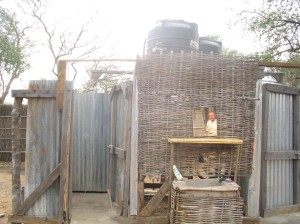
Compound showers and sink
This was heavenly compared to many parts of Africa where you may just be given a bucket of water to use to wash up every 2 or 3 days. We had showers like Mash 4077 — but it was great. All cold water –which felt good in the climate — and the local women hauled the water from the well and filled barrels which were hooked up to the shower head. Water is precious, so we tried very hard not to waste it.
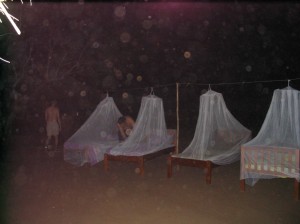
Night time at the Dajo Marriott
The tukuls were like ovens. We pretty much just kept our stuff in them and spent as little time in them as possible. Because it was so unbearably hot, we all pulled our beds out under a clothesline, hung our mosquito nets from the line and slept outside every night.
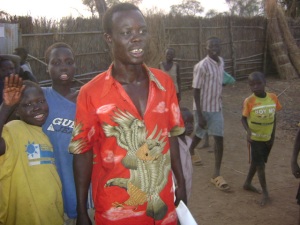
Gutidi
This is Gutidi. He went everywhere with us. On the hike to Tedubi, Danny and I noticed that he was wearing men’s black leather shoes and the soles were coming off and his toes had worn through the leather. He most likely got them from an NGO and who knows how well they fit. We were told that he was poorer than some of the other young local men, so when we were handing out translator gifts before we left, Danny and I put together a special package for Gutidi. I left him the sandals I bought in Lokichokio, Danny added his tennis shoes, a pair of pants and two tee shirts, and I had a couple of new pairs of men’s white tube socks. Gutidi walks long distances to get to the compound, so I also gave him an extra water bladder that we had. We gave him our gift and one of the translators showed him how to use the water bladder. He was so overwhelmed he didn’t know what to say.
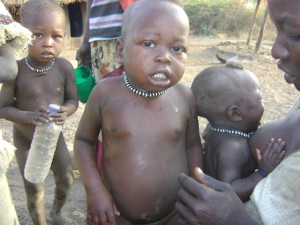
These are small children in one of the villages we hiked through. Toddlers and infants are generally naked. And many are malnourished.
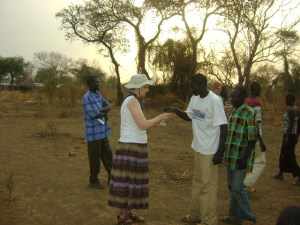
Dajo Presbyterian Church
On the Sunday we were in Dajo, we all split up and went as honored guests to the various churches. Nancy and I went to the Presbyterian church. The church was actually a tukul and it was fairly comfortable when we arrived and the service started. But as the morning went on, it became increasingly hotter and I couldn’t wait to get outside. The church service actually lasted 3+ hours.
More in the next post.
